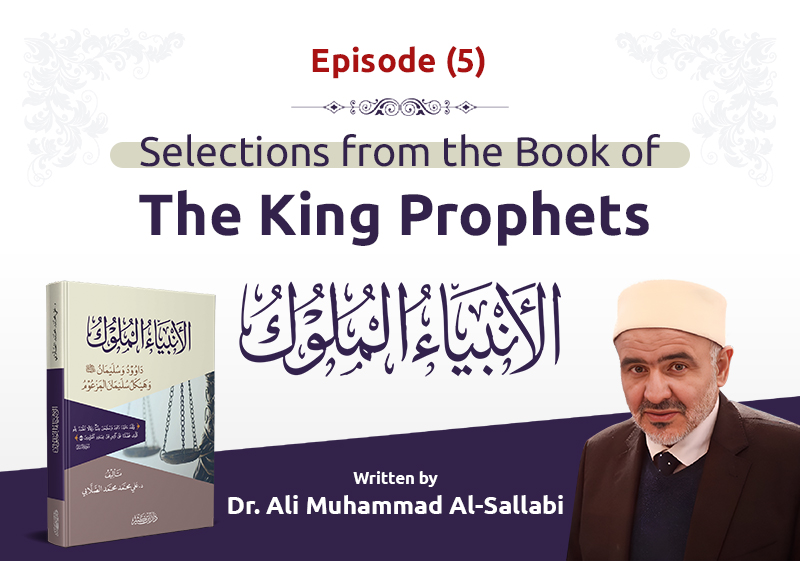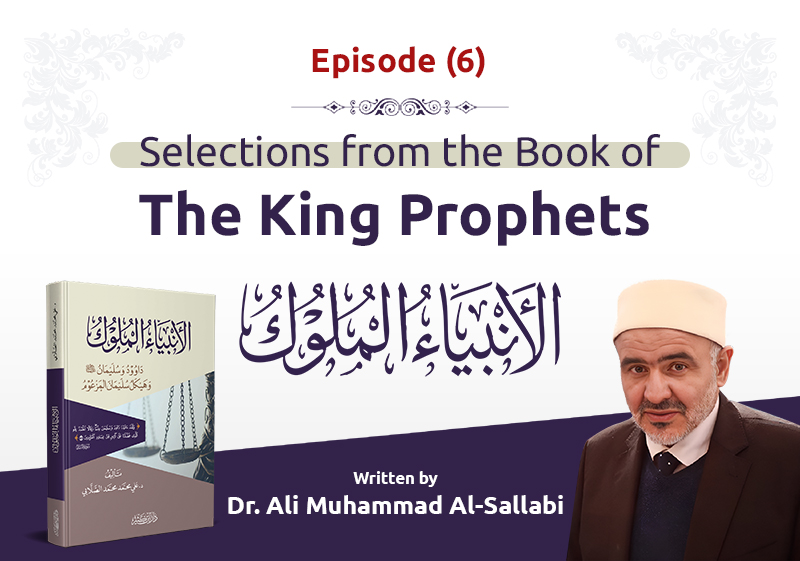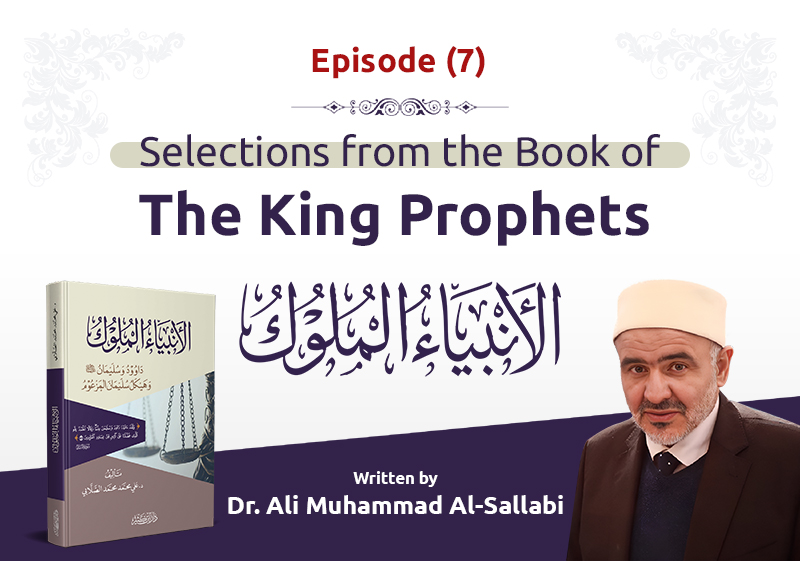The death of Moses (peace be upon him):
Selections from the Book The King Prophets...
Written by Dr. Ali Muhammad Al-Sallabi...
Episode (5)
Moses (peace be upon him) was one of the most determined messengers, who achieved monotheism and singled out Allah for worship. He fought Pharaoh and his unjust regime with reason, wisdom, arguments and proofs, and Allah made him the reason for saving the children of Israel from the tyrannical Pharaonic regime. His great personality was distinguished by beautiful qualities and noble morals: he used to supplicate a lot to Allah Almighty and supplicate before Him, and he was very afraid of Him, relying on Him, and patient with the costs and hardships of the call, honest with his Lord, courageous and fearing only God, knowledgeable, wise, trustworthy, strong, merciful, and helpful for the oppressed, and other good morals and noble qualities by which he lived among the people, and called for them and taught them to those who responded to his call.
This solid moral system contributed to the moral foundation and divine approach that the monotheists for Allah Almighty followed during his reign and after his death.
Among the most important of these morals and qualities are: sincerity and patience, his servitude to Allah, Musa’ (peace be upon him) veneration of his Lord and his fear of him, trust in Allah, gratitude, charity, knowledge, strength of faith, frequent supplication, humility, admission of mistakes, chivalry, helping the weak, and determination. The Children of Israel continued to wander in Sinai, and Moses (peace be upon him) continued his journey and entered the Holy Land to educate them on the values of jihad. During this period, Allah’s Prophet Aaron (peace be upon him) died. Aaron (peace be upon him) was alive at the beginning of the wandering.
The Almighty said: {[Musa] said, “My Lord, indeed I do not possess except myself and my brother, so part us from the defiantly disobedient people” (25) [Allah] said, “Then indeed, it is forbidden to them for forty years [in which] they will wander throughout the land. So do not grieve over the defiantly disobedient people” (26)} [Al-Ma’idah: 25-26], and he is not mentioned in the Qur’an, nor in the authentic hadith after that.
The Israeli stories talked a lot about the death of Aaron (peace be upon him), and went into detail about it, mentioning the children of Israel’s accusation of Moses (peace be upon him) for killing Aaron, and Moses’ defense of himself. It specified the place where Aaron was buried, but we will not go with those Israeli stories, we believe in what is stated in the Qur’anic verses and authentic hadiths. After the death of Aaron, Moses (peace be upon him) continued to raise the new generation of the Children of Israel, assisted in this by his righteous boy, Joshua bin Nun.
Finally, the time of Moses (peace be upon him) came, and Allah destined to end his life, which he lived through trials and tribulations and faced them with patience, steadfastness, and endurance, and exerted his efforts in raising the children of Israel and improving their determination and resolve. His time came, while he was raising the new generation of his people and preparing them to enter the Holy Land. On the authority of Anas bin Malik, may Allah be pleased with him, on the authority of the Messenger of Allah (may Allah’s prayers and peace be upon him) - in the hadith of the Night Journey and Ascension - he said: “I passed by Moses on the night of my journey near the Red Dune while he was busy praying in his grave”.
That is: The Messenger of Allah saw Moses (peace be upon them) praying in his grave near the Red Dune, on his way from the Sacred Mosque in Mecca to the Al-Aqsa Mosque in Al-Quds on the journey of the Night Journey and Mi’raj.
Sheikh Salah Al-Khalidi said: The Night Journey road was the road between the Hijaz and the Levant, so perhaps the red dune mentioned in the hadith is in the Ma’an region in southern Jordan, or the Wadi Araba region, or the region east of the Jordan River. The hadith indicates that Moses (peace be upon him) is alive in his grave, and his special life is not according to the standards of our worldly life because he left this life, but rather his life is a life of barzakh that befits him. It is known that the prophets are alive in their graves, living a special life, and that the earth does not consume their bodies.
Moses (peace be upon him) was praying to Allah Almighty in his grave. It is a special prayer, a remembrance of Allah and praise for Him, and it is not an obligation, because there is no obligation after death.
Conclusion: We cannot determine the place where Moses (peace be upon him) was buried. All that the hadith mentioned is that his grave is next to the road at the Red Dune. Moreover, this grave and the Red Dune are not in the Holy Land, but rather they are on its outskirts, a stone’s throw away from it, because Moses (peace be upon him) died before his people entered the Holy Land, and they entered it after his burial, they were led by his successor, Joshua bin Nun. They did not take him with them, nor did they bury him in the Holy Land, because every prophet is buried in the place where he died.
The evidence for this is what was narrated by Ahmad and Al-Tirmidhi on the authority of Ibn Abbas, may Allah be pleased with them: The Companions of the Prophet Muhammad, may Allah bless him and grant him peace, did not know where to bury the Prophet, until Abu Bakr, may Allah be pleased with him, said: I heard the Messenger of Allah, may Allah bless him and grant him peace, say: “A Prophet is not to be buried except where he died".
Ibn Majah narrated: On the authority of Abu Bakr al-Siddiq, may Allah be pleased with him, he said: I heard the Messenger of Allah, may Allah bless him and grant him peace, saying: “No Prophet ever passed away but he was buried where he died”. This means that Moses (peace be upon him) was buried in the place where he passed away, and was not buried in the Holy Land, nor was he transferred to it. Allah knows.
Thus, the life of Moses (peace be upon him) ended, and his biography and story remained, which he lived for Allah, with Allah, and for the sake of calling for monotheism, teaching people to worship Allah and His law, saving the oppressed, and establishing evidence against the ungrateful Pharaohs.
Moses (peace be upon him) lived and was able to lay the foundations of a divine civilization based on Allah’s piety and monotheism, and that civilization was completed after his death during the reign of Saul, David, and Solomon (peace be upon them). So the children of Israel became the state of David, then Solomon (peace be upon them) after they had been weak under the rule of the Pharaohs.
Episode references:
- Ali Muhammad Al-Sallabi, The King Prophets, first edition, Dar Ibn Kathir, 2023, pp. 41-45.
- Quranic Stories (3/332).
For further information and review of the sources for the article, see:
The Book of King Prophets on the official website of Sheikh Dr. Ali Muhammad Al-Sallabi:
https://www.alsalabi.com/salabibooksOnePage/689






